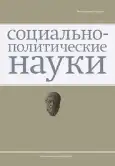Geopolitical Status of the States of the Korean Peninsula (Republic of Korea and DPRK)
- Authors: Samkaev I.M.1
-
Affiliations:
- Honorary Consul of the Republic of Korea in Tyumen (in the Ural Federal District)
- Issue: Vol 13, No 4 (2023)
- Pages: 98-104
- Section: International Relations, Global and Regional Studies
- URL: https://journals.eco-vector.com/2223-0092/article/view/584767
- DOI: https://doi.org/10.33693/2223-0092-2023-13-4-98-104
- ID: 584767
Cite item
Abstract
In the context of the sanctions policy of the West, Russia’s turn towards the Asia-Pacific region seems quite promising. In this regard, it was interesting for the author to look at the geopolitical status of the Republic of Korea and the DPRK in the current situation. The geographical characteristics of both states were analyzed from the standpoint of the possibilities of political and economic influence of these countries on world politics, as well as on relations with Russia. Socio-economic parameters were presented both in terms of demographics and in terms of urbanization, development of the transport system and industry. Foreign economic and military-technical policy was considered in the context of interaction between the ROK and the DPRK with Russia. However, a number of problems were identified that today exist on the path of unhindered economic relations between the Republic of Kazakhstan and the Russian Federation.
Keywords
Full Text
About the authors
Igor M. Samkaev
Honorary Consul of the Republic of Korea in Tyumen (in the Ural Federal District)
Author for correspondence.
Email: sim2062.92@gmail.com
ORCID iD: 0000-0003-3682-4944
candidate of economics; honorary consul of the Republic of Korea in Tyumen (in the Ural federal district)
Russian Federation, TyumenReferences
- Hong Soon-Jick. Environmental Pollution in North Korea: Another South Korean burden? East Asian Rev. 1999. Vol. 11. No. 2. Pp. 79–98.
- Ageev A., Kuroedov B., Sandarov O. Military potential of 100 leading countries of the world. Economic Strategies. 2011. No. 1. Pp. 18–25. (In Rus.)
- Anosova L.A., Matveeva G.S. South Korea. View from Russia. Moscow: Nauka, 1994. 252 p.
- Denisov V.I. North Korean armed forces and their role in the political life of the DPRK. MGIMO Bulletin. 2011. No. 4. Pp. 44–48. (In Rus.)
- Denisov V.I. Socio-economic situation in the DPRK and the problem of succession of supreme power in the country. In: The best works of scientists of the Institute of International Studies in 2012. Issue 1. A.A. Orlov (ed.). Moscow: MGIMO-University, 2013. Pp. 14–16.
- Human Development Report 2021/2022. Uncertain times, Unsettled Lives: Shaping our future in a Changing World. New York, 2022. 44 p.
- Kim G.N. Republic of Korea: Handbook. Almaty: Dyke-Press, 2010. 584 p.
- Kurbanov S.O. Ideas of Juche: Confucian tradition. Oriental Collection, 2001. No. 4 (7). Pp. 58–65. (In Rus.)
- Pospelova O.I. Features of culture and national mentality of the inhabitants of the Republic of Korea. Scientific Bulletin of MGIIT. 2012. No. 2. Pp. 35–40. (In Rus.)
- Russia and the countries of the world. 2022: Statistical collection. Moscow: Rosstat, 2022. 130 p.
- Rusetsky E.A. Actions of the Administration of the Republic of Korea to increase arms exports in the context of the global financial crisis. Russia and the Asia-Pacific Region. 2009. No. 2. Pp. 64–76. (In Rus.)
- Countries and regions. 2005: Statistical Handbook of the World Bank. Moscow: The Whole World, 2005. 239 p.
- Tikhonov V.M., Kan M. History of Korea: In 2 vols. Vol. 1: From ancient times to 1904. Moscow: Natalis, 2011. 533 p.
- Jung Byung-taek. The current state and structure of international trade in services in the Republic of Korea. Russian Foreign Economic Bulletin. 2019. No.8. Pp. 31–44. (In Rus.)
Supplementary files











